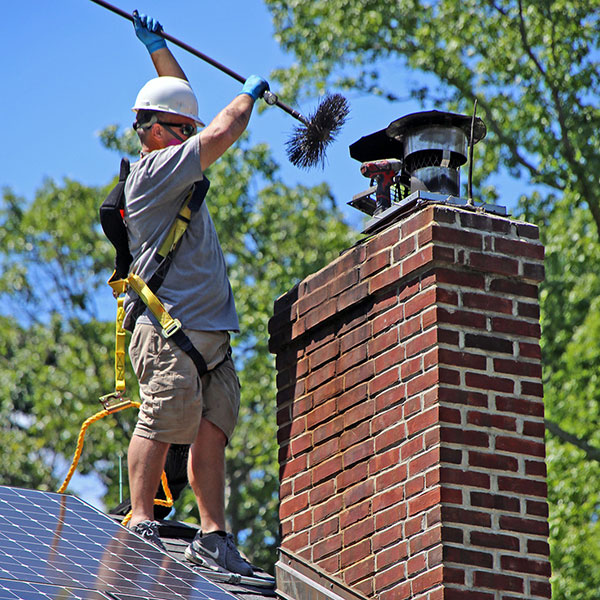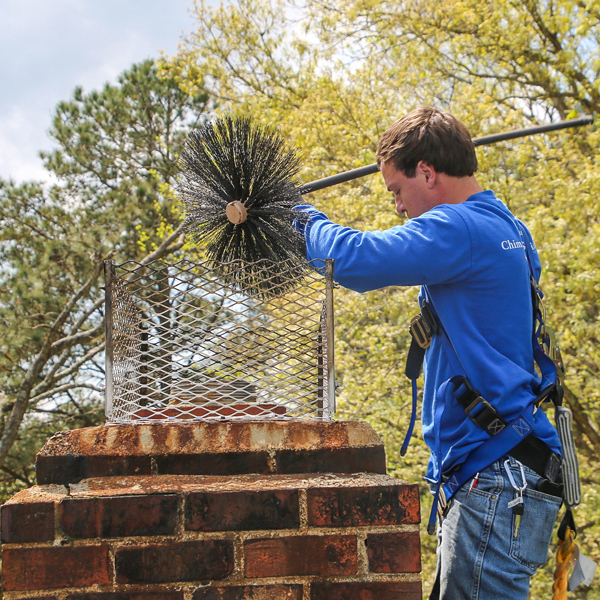Expert Chimney Clean Company Fremont: Elevate Your Fire Place Experience Today
Expert Chimney Clean Company Fremont: Elevate Your Fire Place Experience Today
Blog Article
Why Routine Smokeshaft Cleansing Is Necessary for Home Safety
Normal smokeshaft cleaning is an usually neglected yet essential facet of keeping a safe and safe and secure home atmosphere. While it might not be one of the most attractive or amazing job on your order of business, neglecting chimney upkeep can have severe repercussions. The accumulation of soot and creosote in your chimney can posture a considerable fire risk, while inadequate air flow can result in the possibly harmful dangers of carbon monoxide poisoning. Moreover, routine chimney cleansing can aid extend the lifespan of your chimney, conserving you from costly repair services or substitutes down the line. But just how exactly does chimney cleaning add to home safety? Let's check out the reasons behind this necessary maintenance job and find the suggestions for appropriate chimney care that every homeowner must recognize.
Value of Normal Smokeshaft Cleansing
Routine chimney cleaning is crucial for keeping a secure and effective home environment. Over time, creosote, a very flammable compound, develops up inside the chimney.
In addition to stopping fires, regular smokeshaft cleansing likewise makes sure the efficient operation of your furnace. When creosote collects, it limits the air movement through the chimney, causing bad burning and lowered home heating effectiveness. This can lead to greater energy bills as your heater functions harder to preserve the preferred temperature level. By routinely cleansing the smokeshaft, you can maximize the airflow and make best use of the efficiency of your heating unit.
In addition, a tidy chimney promotes great interior air top quality. As the chimney becomes clogged up with creosote and particles, it can impede the correct venting of hazardous gases, such as carbon monoxide gas. These gases can seep right into your home, posing a significant health and wellness risk to you and your family. Regular smokeshaft cleansing guarantees that the air flow system is clear and working properly, stopping the buildup of unsafe gases.
Fire Threat: Accumulation of Residue and Creosote
The buildup of soot and creosote inside the chimney poses a significant fire risk, as it can ignite and create a possibly terrible chimney fire. Soot is a black, carbonaceous compound that is formed when wood or nonrenewable fuel sources are melted. It includes great particles that can quickly come to be airborne and clear up inside the smokeshaft. Over time, these fragments collect and create a layer of soot. Creosote, on the other hand, is a sticky and extremely flammable compound that is generated when wood or fossil gas are melted at reduced temperatures. It is a byproduct of insufficient burning and can comply with the internal walls of the smokeshaft.
The intense warm produced throughout a chimney fire can trigger the smokeshaft to split or collapse, leading to a prospective home fire. In addition, the fires and stimulates from the smokeshaft fire can run away via the smokeshaft cap and spark the roof or bordering flammable materials.

Regular chimney cleansing is necessary to remove the accumulation of soot and creosote and lower the threat of a smokeshaft fire. A professional chimney sweeper will make use of customized brushes and devices to thoroughly clean up the chimney, eliminating any type of gathered particles. By maintaining the chimney clean and cost-free from residue and creosote, house owners can ensure the risk-free and efficient operation of their fireplace or stove, while also securing their home from the threats of a chimney fire.
Poor Air Flow and Carbon Monoxide Threats
Insufficient air flow in chimneys can pose major threats of carbon monoxide gas poisoning. Carbon monoxide (CO) is an anemic, odor free gas that is produced when gas such as gas, oil, or wood are burned. When chimneys are not correctly ventilated, CO can build up and leak right into the home of a home, leading to possibly serious circumstances.
Among the main sources of bad smokeshaft air flow is the build-up of particles, such as soot and creosote, which can block the flue and limit the circulation of air. This can result in incomplete combustion and the production of greater levels of CO. In addition, a chimney that is not on a regular basis cleaned up can have an accumulation of various other blockages, like bird nests or leaves, further hampering the proper ventilation of hazardous gases.
The effects of carbon monoxide gas poisoning can be refined and conveniently misinterpreted for other health problems, such as the influenza. Symptoms may consist of frustrations, dizziness, queasiness, fatigue, and confusion. Prolonged exposure to high degrees of carbon monoxide can cause unfamiliarity, organ damage, and also death.
Routine chimney cleaning and assessment are important in maintaining proper ventilation and reducing the danger of carbon monoxide poisoning. By getting rid of any type of blockages and guaranteeing that the flue is clear, property owners can take pleasure in a healthy and risk-free living setting. It is advised to have smokeshafts examined and cleaned up a minimum of annually by click site an expert chimney sweeper to ensure optimal security and satisfaction.
Extending the Lifespan of Your Smokeshaft
To ensure the long life of your chimney, correct upkeep and care are important. Routine smokeshaft cleansing is not only essential for home safety and security yet additionally for extending the life-span of your chimney. Over time, debris, creosote, and residue can collect inside the chimney, leading to different concerns that can substantially lower its life expectancy.
One of the primary benefits of regular chimney cleaning is the prevention of smokeshaft fires. If not gotten rid of, it can build up inside the smokeshaft and fire up, triggering a potentially terrible and dangerous smokeshaft fire.
Moreover, regular chimney cleaning likewise helps to prevent obstructions. When particles, such as leaves, branches, or even tiny pets' nests, obstruct the chimney, it can prevent appropriate ventilation and air movement. This can cause a buildup of harmful gases, such as carbon monoxide, inside the home. By maintaining the chimney clear and clean, you can ensure correct ventilation and reduce the danger of carbon monoxide poisoning.
Along with avoiding clogs and fires, regular chimney cleaning can also determine and address any possible damage or degeneration. By inspecting the chimney throughout the cleansing process, you can catch any type of early indications of splits, leaks, or structural issues. Motivate fixings can be made to avoid further damage and expand the lifespan of your chimney.
Tips for Proper Smokeshaft Upkeep
For effective chimney upkeep, it is essential to follow a couple of vital ideas to guarantee the long life and safety of your smokeshaft. These tips will website here certainly not just her response aid you keep the effectiveness of your smokeshaft but likewise lower the threat of smokeshaft fires and various other possible threats.
To start with, it is vital to have your smokeshaft inspected and cleaned up by a specialist smokeshaft sweep at least annually. A professional will be able to determine any kind of prospective concerns such as creosote accumulation, pet nests, or architectural damage that might pose a danger to your smokeshaft's efficiency and security.
Along with yearly assessments, it is essential to frequently examine and cleanse your chimney's flue and cap. The flue needs to be free from any particles or blockages that could restrict airflow or cause smoke to back up right into your home. The smokeshaft cap should remain in great condition, securely affixed, and complimentary of any cracks or damage to stop undesirable guests such as birds or squirrels from entering your chimney.
Moreover, it is important to use dry and seasoned wood for melting in your fire place. Wet or environment-friendly wood creates more smoke and creosote, resulting in a greater danger of smokeshaft fires. Furthermore, prevent burning materials such as garbage, cardboard, or dealt with wood, as they can launch hazardous chemicals and harm your chimney.
Last but not least, make certain that your chimney is furnished with a strong stimulate arrestor to prevent embers and stimulates from leaving and possibly triggering a fire. Chimney Clean Company Fremont.
Following these ideas for proper chimney upkeep will certainly assist ensure the security and long life of your chimney and provide assurance for you and your household.

Conclusion
In verdict, routine chimney cleaning is vital for preserving home security. The accumulation of soot and creosote can cause fire risks, while inadequate ventilation can boost the danger of carbon monoxide poisoning. By on a regular basis cleaning up and preserving your smokeshaft, you can prolong its lifespan and ensure the security of your home and household. It is necessary to comply with proper chimney upkeep ideas to avoid any type of potential threats.

One of the primary benefits of normal smokeshaft cleaning is the prevention of smokeshaft fires - Chimney Clean Company Fremont. The chimney cap ought to be in excellent condition, firmly attached, and complimentary of any fractures or damages to prevent undesirable visitors such as birds or squirrels from entering your chimney
Report this page